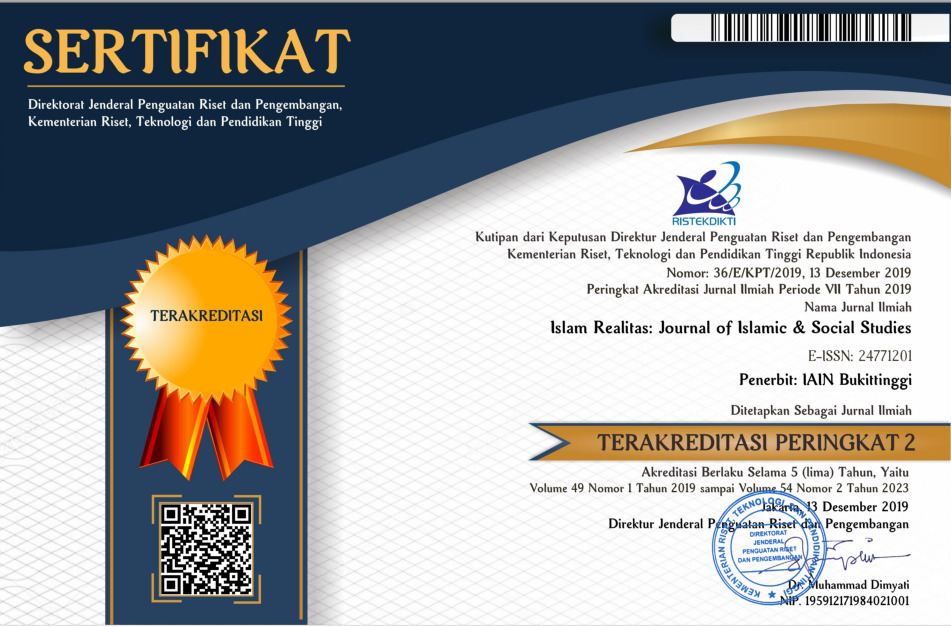The Spiritual Philosophy of Ibn al-'Arabi: Between the Exoteric and Esoteric Dimension
DOI:
https://doi.org/10.30983/fuaduna.v6i1.5527Keywords:
Exoteric, Esoteric, Ibn al-‘Arabi, Spiritual philosophy, Sufism.Abstract
The objective of this article is to examine the spiritual philosophy of Ibn al-‘Arabi especially the spiritual stages start from the religious teaching aspects (exoteric) and spiritual (esoteric). The complexity of Ibn al-‘Arabi’s teachings needs to be investigate to respond the accusations from the religious conservative groups that state the practices done by the spiritualists are deviant religious teachings and even are considered as strange behavior and a symptom of mental illness. Through literature study, this research uses descriptive analysis method or content analysis with a normative theological approach to Ibn Arabi's works. The present study first investigated how Ibn al-’Arabi explained the dichotomy between the exoteric and esoteric dimensions and also its impact on the psychology in his spiritual philosophy. The findings of this study showed that the stages of the spiritual such as repentance, asceticism, austerity, ecstasy, clairvoyance, and so on are the transcendental consciousness which cannot be understood using only the esoteric dimension, but also using the obedience toward the exoteric dimension. A true spiritualist such as the saints and the prophets are the spokesman for God on the earth to give the enlightenment of the life in the world.
References
Abd Rasyid, Nurhayati. “The Concept of Al-Wihdatul Wujud Ibnu Arabi (A Sufistic Philosophical Study).†HUNAFA: Jurnal Studia Islamika 17, no. 1 (2020): 72–87.
Abdullah, Amin. Studi Agama: Normativitas Atau Historisitas. Yogyakarta: Pustaka Pelajar, 1999.
Affifi, Abul Ela. The Twenty-Nine Pages: An Intorduction to Ibn ‘Arabi’s Metaphysics of Unity. Cambridge: Eng.: Beshara Publications, 1998.
Akbar, Ali. “Looking at Ibn ‘Arabi’s Notion of Wahdat Al-Wujud as a Basis for Plural Path to God.†Journal of Islamic Studies and Culture 4, no. 1 (2016): 45–51. https://doi.org/10.15640/jisc.v4n1a6.
al-ʻArabī, Ibn, and Abul Ela Affifi. Fusus Al-Hikam. Dar al-kitab al-’Arabi, 1966.
Al-Najjar, Amir. Al-’Ilm Al-Nafs Wa Al-Shufiyyah. Cairo: Dar al-Ilmi, 1980.
Arberry, Arthur John. Sufism: An Account of the Mystics of Islam. Vol. 2. Courier Corporation, 2002.
Burckhardt, Titus. Mystical Astrology According to Ibn Ê¿Arabi. Vol. 1. Granite Hill Publishers, 2001.
Chittick, William C. Sufism A Beginner’s Guide. Oxford: Oneworld, 2008.
Chittick, William C. Imaginal Worlds: Ibn Al-’Arabi and the Problem of Religious Diversity. Choice Reviews Online. Vol. 32. SUNY Press, 1995. https://doi.org/10.5860/choice.32-4426.
———. The Sufi Path of Knowledge: Ibn Al-Arabi’s Metaphysics of Imagination. Suny Press, 2010.
Clark, Walter Houston. “The Psychology of Religion.†Pastoral Psychology 9, no. 4 (1958): 49–55.
Danismaz, Idiris. “Ibn Arabi Thoughts in the Practice of Ordinary Muslims: From the" Ethical Interpretation" and" Practical Application" Perspective of Ä°smail Hakkı Bursevi.â€ ã‚¤ã‚¹ãƒ©ãƒ¼ãƒ ä¸–ç•Œç ”ç©¶: Kyoto Bulletin of Islamic Area Studies 11 (2018): 85–94.
Faris, Robert E. L., Calvin S. Hall, and Gardner Lindzey. “Theories of Personality.†American Sociological Review, 1957. https://doi.org/10.2307/2089174.
Farouki, Suha Taji. Beshara and Ibn ‘Arabi: A Movement of Sufi Spirituality in the Modern World. Oxford: ANqa Publishing, 2007.
Gorjian, Mohammad Mahdi. “Mystical Psychology in Ibn Arabi’s Thought in the Book Al-Futuhat Al-Makkiah with an Emphasis on Temporality or Eternity of the Soul.†Practice of Wisdom 13, no. 48 (2021): 7–36.
Halligan, Fredrica R. “The Creative Imagination of the Sufi Mystic, Ibn ’Arabi.†Journal of Religion and Health 40, no. 2 (2001): 275–87. https://doi.org/10.1023/A:1012557708145.
Ibn’Arabī. The Wisdom of the Prophets:(Fusus Al-Hikam). Beshara Publ., 1975.
Ibn Arabi, Muhyiddin. Al-Futûhât Al-Makkiyyah. Beirut: Dar al-Fikr, 1975.
———. Tafsir Al-Qur’an Al-Karim. Dar Al-Kutub Al-Ilmiyah. Beirut, 2006.
Izutsu, Toshihiko. Sufism and Taoism: A Comparative Study of Key Philosophical Concepts. Univ of California Press, 2016.
Kakaie, Ghasem. “The Dialogue Between Islam and Christianity as Viewed by Ibn Arabi and Eckhart.†STUDIES IN INTERRELIGIOUS DIALOGUE 14, no. 2 (2004): 177–201.
Kamada, Shigeru. “Mulla Sadra’s Imama/Walaya : A n Aspect of His Indebtedness to Ibn Arabi.†Journal of Islamic Philosophy 6, no. 1 (2010): 67–78.
Khan, Hazrat Inayat. The Sufi Message of Hazrat Inayat Khan: The Unity of Religious Ideals. Vol. 1. Library of Alexandria, 1963.
Moradian, Mahmoud Reza. “Levels of Divine Names and Their Relation with Principles of Ibn’Arabi’s Philosophy of Unity of Existence (Waḥdat Al-Wujūd).†Journal Of Islamic Denominations 7, no. 13 (2020): 277–301.
Morris, James W. “Ibn ’Arabi’s ‘Esotericism’: The Problem of Spiritual Authority.†Studia Islamica 71, no. 71 (1990): 37. https://doi.org/10.2307/1595637.
Nasr, Sayyed Hossein. “Tradition Muslim in the Modern World.†Kuala Lumpur: Foundation For Traditional Studies, 1988.
Nata, Abuddin. Metodologi Studi Islam. Jakarta: Rajawali Pers, 2000.
Nazemian, Reza, Mohammad Hadi Moradi, and Hadi Azizi. “A Psychological Study of Ibn Arabi in the Novel ‘A Small Death’ of Hassan Alwan, Based on the Psychological Method Analysis of the Narration of ‘A Small Death’ on the Basis of Psychological Method (Freud and Lacan’s Theories as a Model).†Quarterly of Arabic Language and Literature 17, no. 4 (2022): 547–73.
Nelson, James M. Psychology, Religion, and Spirituality. Springer. Vol. New York: Springer US, 2009.
Nicholson, Reynold Alleyne. The Mystics of Islam. Routledge & Kegan Paul Books, 1914.
NÅ«rbaḫš, ǦawÄd. The Psychology of Sufism:(Del Wa Nafs); a Discussion of the Stages of Progress and Development of the Sufi’s Psyche While on the Sufi Path. Khaniqahi-Nimatullahi, 1992.
Palacios, Asian. Ibn ‘Arabi: Hayâtuh Wa Madzhabuh. Beirut: Dar Al-Qalam, 1979.
Putra, Andri Azis, Arqom Kuswanjono, and Misnal Munir. “Sufistic Consciousness as A Foundation of Religious Well-Being in Ibn ‘Arabi’s Teaching to Understanding Existential Uncertainty.†Jurnal Theologia 32, no. 2 (2022): 173–92.
Renard, John. The A to Z of Sufism. The Scarecrow Press. Vol. 53. Lanham, Toronto, 2009. https://doi.org/10.1017/CBO9781107415324.004.
Ridwan, M. Deden. Tradisi Baru Penelitian Agama Islam Tinjauan Antardisiplin Ilmu. Bandung: Nuansa Cendekia, 2001.
Rozi, Syafwan. “Uderstanding the Concept of Ecosufism: Harmony and the Relationship of God, Nature and Humans in Mystical Philosophy of Ibn Arabi.†Ulumuna 23, no. 2 (2019): 242–65.
Schuon, Frithjof. The Transcendent Unity of Religions (P. Townsend, Trans.). Pantheon. New York, 1953.
Shah, Muhammad Maroof. “The Discourse of the Beyond and Nondualism: Reflections on AstÄvakra Åšankara and Ibn Arabi.†The Journal of East West Thought 8, no. 2 (2018): 77–104.
Taylor, Eugene. William James on Consciousness beyond the Margin. Princeton University Press, 2011.
Thouless, Robert H. An Introduction to the Psychology of Religion. Vol. 526. CUP Archive, 1971.
Trimingham, J Spencer. The Sufi Orders in Islam. Oxford University Press, 1998.
Webb, Gisela Goodrich. “The Human/Angelic Relation in the Philosophies of Suhrawardi and Ibn Arabi.†American Journal of Islamic Social Sciences 7, no. 1 (1989): 128.
Yiangou, Nikos. “Is a New Consciousness Emerging ? Reflections on the Thought of Ibn ’ Arabi and the Impact of an Integral Perspective IS A NEW CONSCIOUSNESS EMERGING ?†World Futures 73, no. 7 (2017): 427–41. https://doi.org/10.1080/02604027.2017.1366794.
Zohar, Danah, and Ian Marshall. Spiritual Capital: Wealth We Can Live By. Berrett-Koehler Publishers, 2004.
Downloads
Submitted
Accepted
Published
Issue
Section
License
Authors who publish with this journal agree to the following terms:
- Authors retain copyright and grant the journal right of first publication with the work simultaneously licensed under a Creative Commons Attribution-ShareAlike 4.0. that allows others to share the work with an acknowledgment of the work's authorship and initial publication in this journal.
- Authors are able to enter into separate, additional contractual arrangements for the non-exclusive distribution of the journal's published version of the work (e.g., post it to an institutional repository or publish it in a book), with an acknowledgment of its initial publication in this journal.
- Authors are permitted and encouraged to post their work online (e.g., in institutional repositories or on their website) prior to and during the submission process, as it can lead to productive exchanges, as well as earlier and greater citation of published work (See The Effect of Open Access).














